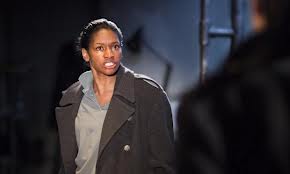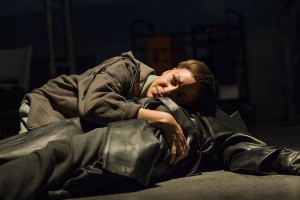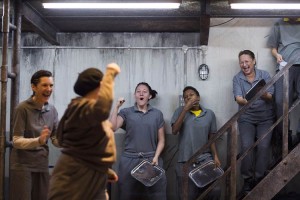In the middle of a crisis of democratic legitimacy is really the perfect time to see Julius Caesar. Especially in Phyllida Lloyd’s smart and powerful all-female production, now at St. Ann’s in Brooklyn by way of London’s Donmar Warehouse. Politics, crisis, and broken systems were buzzing in my head during my espirit d’interstate drive home.
Like Ben Brantley in the Times, I loved this show’s intensity, its close, confined prison-house aesthetic, and the verve and swagger of the actors. The prison setting was something I’ve seen before, notably in Propeller’s all-male Merchant at BAM a few years back, but this version of the frame-play was more fun, as when Cinna the Poet told his fellow prisoner-players to fuck off when they would not back down in the mistaken identity episode in 3.3. (I wonder about the rage for playing inside institutions – the prisons, the Macbeth-in-mental-asylum I saw on Broadway last spring. Anxieties about performing inside the hyper-canon of Shakespeare?)
It’s a play about power and competition, and that’s what’s been roiling me since Tuesday night. Frances Barber’s Caesar was as charismatic a stage performance as I’ve seen in a long time: loose-limbed, physical, active, totally in control of the stage and the audience. Like many of these drag king performances (I owe that useful term to post-show conversation with Alison Kinney), she (pronouns will be a problem in this review! maybe I’ll just mix them) projected an authority based, as near as I can figure it, on love. Fear and power, too, but mostly love and shared identity. Caesar’s followers loved him and sought to be close to him. A series of faux-fascist gestures — a bent-elbow salute, masks with Caesar’s image on them – emphasized the cult of personality, but I was also struck by Caesar’s physical attentiveness, her horseplay and embracing of each Roman on stage (including those we know to be conspirators), and her stage-filling presence. In the case of Cassius, whose “lean and hungry look” Caesar parsed shrewdly, she practiced domination by doughnut: holding him by the neck, forcing a pastry Antony has brought onstage into his mouth, smiling at his dismay. Like a mother feeding a recalcitrant child?
Despite Caesar’s claims for singularity, she wasn’t the only star in the firmament. Jenny Jules’s angry Cassius was probably my favorite performance: fiery, contained, smart, deeply connected to her fellow Romans/prisoners. Why should Caesar rule? What if against her hands-on masculinity, her among-the-boys grabbing and wrestling, we oppose a harder, colder, more strategic conspiracy? Cassius got most of his good lines early, while seducing Brutus into the plot, and in her resistance to Caesar’s welding of the prison-company into one corporate body we see a plea for separation, individuality, for leaving just a little of him to herself. What if he didn’t want to eat Caesar’s doughnut? Why shouldn’t one man be just a man (or a woman, as the case may be)?
The most enigmatic performance for me was Cush Jumbo’s Mark Antony. Playing the femme to Caesar’s butch, her role in inciting the mob after the murder unfolded slowly, quietly, as a mirror image of Caesar’s bravado. At first I wasn’t convinced by the performance — I’m still under the spell of Toneelgroep’s incandescent raging last year — but, partly through listening to Alison Kinney’s very smart commentary, I’m coming around to this Antony. If all the drag king parts involve impersonating different versions of masculinity — which surely is part of what Julius Caesar is about — Antony’s inversion of Caesar follows a route to masculine power through feminine seduction. This Antony may have his problems with Octavius down the road — was the cast thinking of Antony’s later woman troubles when they double-cast Portia as Octavius? Or about Antony’s cross-dressing episodes in the next play with Cleopatra? — but her seductive politics snuck up on the dogs of war before letting ’em slip.
The staging of the assassination involved displacing one front-row audience member, putting her seat on the stage, and plopping Caesar into the vacated space. With her face video-projected in close-up on the back of the stage, she growled out iron singularity: “I do know but one / That unassailable holds on his rank, / Unshak’d of motion, and that I am he” (3.2). While the conspirators stab her, she’s sitting in an audience-member’s seat, a force for corporate identity partaking in community for the last time.
How can I write about this show without talking about the noblest Roman of them all? Harriet Walter’s Brutus was lean, angular, tall, oblique. A bit distant and patrician, it seemed to me – resistant to Cassius’s love, to the conspirators’ desire for unity, to Caesar’s gruff embrace. The great idealist in a play of realpolitik, Brutus in this performance seemed oddly detached from the struggle. When she spoke his short prose oration defending her role in Caesar’s murder, the balaclava-wearing crowd onstage ran around in circles, ignoring him.
Some of the air went out of the balloon after Caesar’s body was cleared away, but the last few acts had some lively things, including an Eddie van Halen guitar and heavy-metal garage band. A final costume change revealed Caesar to be one of the guards, rather than a prisoner like the rest of the actors. Too simple a political allegory? O Julius Caesar, thou art mighty yet!
One last highlight was Clare Dunne’s Irish-accented Portia, who raged at Brutus’s close-lipped plotting while dominating the stage with her pregnant body. She was double-cast as Octavius Caesar, in which part the force that had failed to move noble Brutus showed itself clearly ready to take over the world.
Get down to St. Ann’s in DUMBO before the show ends on Nov 3!





Leave a Reply